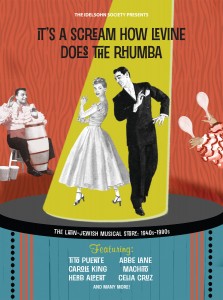Albums
-
Please allow 2-3 weeks for delivery on all orders.
For questions or wholesale orders, please email us at idelsohnsocietyinfo@gmail.com.
It’s a Scream How Levine Does the Rhumba: The Latin-Jewish Musical Story 1940s-1980s (CD, $17.99)
This two-disc set chronicles the musical confluence between Latinos and Jews in the U.S. Liner note contributors include Los Lobos’ Steve Berlin and bandleader Arturo O’Farrill.
This is the first album of its kind to excavate and mine this cross-cultural tale of sweaty mambo dance-floors and the weekend Borscht Belt ballrooms of Catskills hotels. The forgotten musical mash-up of Latin and Jewish, bagels and bongos, Spanish and Yiddish, manteca and schmaltz, that’s been a bubbling undercurrent of American pop music since the early 1900s. It’s a story full of Jewish mambo dancers, Jewish salsa greats, beloved sidemen, and record label chiefs on the one hand, and Latino bandleaders, singers, composers, and entrepreneurs on the other.
Disc 1
1. Irving Kaufman: Moe the Schmo Takes a Rhumba Lesson; 2. The Barton Brothers: Arriba (Part 1); 3. Xavier Cugat and His Orchestra: Miami Beach Rhumba; 4. Pupi Campo and His Orchestra: Joe and Paul; 5. Al Gomez Orchestra: Sheyn Vi Di Levone; 6. Ruth Wallis: It’s a Scream How Levine Does the Rhumba; 7. Alfredito and His Orchestra: Mambo – For Dancers Only; 8. The Crows with Melino and His Orchestra: Mambo Shevitz (Man, Oh Man); 9. Candido featuring Al Cohn: Cheek to Cheek; 10. Slim Gaillard: Meshuganah Mambo; 11. The Barry Sisters: Channah From Havana; 12. Mickey Katz and His Orchestra: My Yiddishe Mambo; 13. Abbe Lane with Tito Puente and His Orchestra: Pan, Amor Y Cha Cha Cha; 14. Machito and His Afro-Cuban Orchestra: Mambo La Concord; 15. Johnny Conquet, His Piano & Orchestra: Matzoh Ball Merengue; 16. Tito Puente and His Orchestra: Grossinger’s Cha Cha Cha; 17. The La Plata Sextette: Raleigh Riff; 18. Don Tosti with Raul Diaz: Loco (ballad); 19. René Bloch: Mambo Chicano; 20. Pérez Prado: The Twist of Hava Nageela; 21. Stan Getz and Charlie Byrd: Desafinado; 22. Little Eva: UptownDisc 2
1. Ray Barretto: Exodus; 2. Eddie Palmieri y su Conjunto “La Perfecta”: El Molestoso; 3. Mongo Santamaría: Watermelon Man; 4. Eydie Gorme & The Trio Los Panchos: Sabor a Mi; 5. Celia Cruz Con Orquesta: Hava Nageela; 6. Joe Quijano:Sabbath Prayer (Plegaria); 7. The Alegre All-Stars: Tema Alegre; 8. La Lupe: América; 9. Mark Weinstein: Just Another Guajira; 10. Herb Alpert & The Tijuana Brass: Belz Mein Shtetele Belz (My Home Town); 11. Harvey Averne: Cucaraca Macara; 12. The Ghetto Brothers: Ghetto Brothers Power; 13. Ron Eliran: Y Volveré; 14. Damirón: Hava Nagila; 15. Pete Yellin: Tojo; 16. Willie Colón: Junio 73; 17. Carole King: Corazón; 18. Andy Harlow’s Latin Fever: Me Llevo a la Marina; 19. Larry Harlow: Yo Soy Latino‘Twas the Night Before Hanukkah: The Musical Battle Beween Christmas and the Festival of Lights (CD, $17.99)
This TWO DISC set is the first-ever history of the duel role of Hanukkah and Christmas music in the 20th century. It’s a musical songbook highlighting both rare and iconic holiday music across both faiths. The 34-tracks feature songs written and performed by Woody Guthrie, The Ramones, Bob Dylan, Dinah Shore, The Klezmatics, Don McLean, Sammy Davis Jr., Mickey Katz, Cantor Yossele Rosenblatt, and many more.
The album features our usual extensive liner notes, plus essays from noted critic Greil Marcus and George Washington University historian Jenna Weissman Joselit.
Disc 1 – Happy Hanukkah
1. “Hanukah” (Gerald Marks), 2. “Hanukkah Dance” (Woody Guthrie), 3. “Yevonim” (Cantor Yossele Rosenblatt), 4. “Rock of Ages” (Cantor David Putterman, 5. “Klezzified” (Klezmer Conservatory Band), 6. “A Chanukah Quiz” (Gladys Gewirtz) 7. “Dreidel, Dreidel, Dreidel” (Ella Jenkins) 8. “Svivon Sov Sov Sov” (Temple B’Nai Abraham of Essex County Children’s Choir) 9. “‘Twas The Night Before Hanukkah” (Stanley Adams and Sid Wayne) 10. “Ocho Kandelikas” (Flory Jagoda) 11. “Grandma’s Dreidel” (Mickey Katz) 12. “The Latke Song” (Debbie Friedman) 13. “Hanukah Tree” (The Klezmatics) 14. “Maccabee March” (Shirley Cohen) 15. “Mo’Oz Tsur” (Sol Zim) 16. “Dreidel” (Don McLean) 17. “Dreidel” (Jeremiah Lockwood, Ethan Miller and Luther Dickinson)
Disc 2 – Merry Christmas
1. “Holiday I.D.” (Lou Reed) 2. “Merry Christmas (I Don’t Wanna Fight Tonight)” (The Ramones) 3. “The Christmas Song” (Mel Torme) 4. “Little Drummer Boy” (Bob Dylan) 5. “Sweetest Dreams Be Thine” (Theodore Bikel) 6. “O Little Town of Bethlehem” (Richard Tucker) 7. “The Problem” (Ray and Barry E. Blitzer 8. “The Twelve Days of Christmas” (Dinah Shore) 9. “Santa Claus is Coming To Town” 10. “El Dia de la Navidad” (Larry Harlow) 11. “O Come All Ye Faithful” (Danny Kaye) 12. “The Only Thing I Want For Christmas” (Eddie Cantor) 13. “It’s Christmas All Over The World” (Sammy Davis Jr.) 14. I Got a Cold for Christmas (The Ames Brothers) 15. “Christmas Eve in My Hometown” (Eddie Fischer) 16. “Jingle Bells” (Herb Alpert and the Tijuana Brass) 17. “White Christmas” (Mitch Miller)
Digital version available for purchase through Amazon.
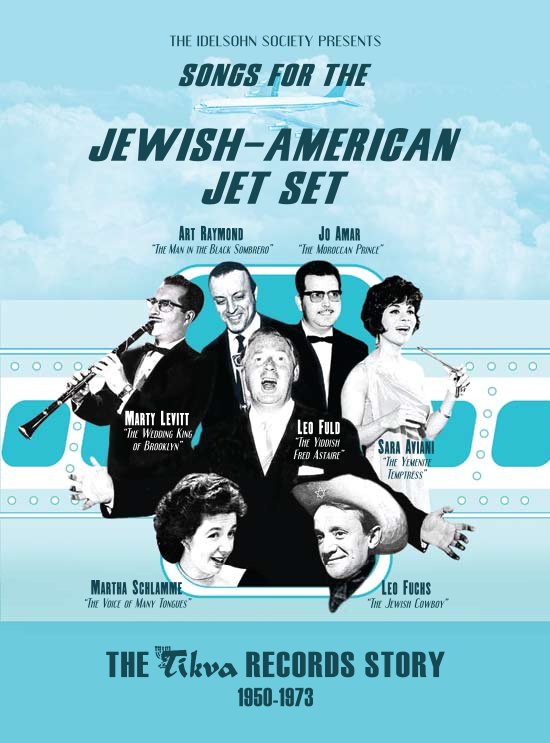
Songs For the Jewish-American Jet Set: The Tikva Records Story 1950-1973 (CD $13.99)
The album is a curated collection of the best of Tikva Records, the flagship independent Jewish record label of 20th century America. Founded in 1947, Tikva’s catalog was wide-ranging; everything from Israeli folk songs to Jewish-American swing, from klezmer pop to cantorial singing, from Catskills comedy to key political speeches of Jewish leaders- and it became something of a “Jewish Motown”, home to the Jewish music world’s biggest names. This album celebrates the label’s sound and the stories behind it.
The album features tracks by Leo Fuld, Leo Fuchs, Martha Schlamme, Marty Levitt, and others, including our signature extensive liner notes with an introduction by legendary Sire Records founder, Seymour Stein.
Full track listing: Leo Fuld, “Mazzel”; Bernie Knee, “Orthodox, Conservative, or Reformed”; The Sabras, “Ho Yaldonet”; Jo Amar, “Ani Ladodi”; Sara Aviani and Her Yemenite Trio, “Weep No More”; Leo Fuchs, “Yiddish-Twist”; Avram Grobard, “Orcha Bamidbar”; Sam Musiker, “Shers”; Jack Brass, “Sherele”; Marty Levitt and Harriet Kane, “I’m a Litvak – He’s a Galitz”; Miriam Kressyn and Seymour Rexite, “It’s So Nice to Have a Man Around the House”; The Yemenite Trio, “Kaduri on the Haliel”; Bernie Knee, “Passover Time on the Range”; Sara Aviani and Her Yemenite Trio, “Esperanza”; Martha Schlamme, “Eingmachts”; The Epstein Brothers, “Freilach #11”; Moishe Oysher, “Balkan Rhapsody”; Leo Fuchs, “Shalom Pardner”; Jo Amar, “L’Oriental”; Leo Fuld, “Zigany Melody”.
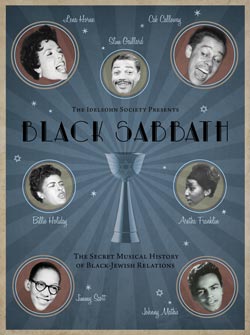
Black Sabbath: The Secret Musical History of Black Jewish Relations (CD, SOLD OUT)
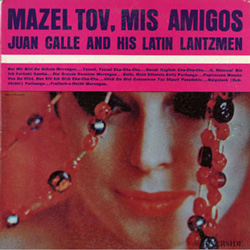
Mazel Tov, Mis Amigos – Juan Calle and His Latin Lanztmen (CD, SOLD OUT)
In 1961, Latin and Jazz star Ray Barretto, Willie Rodriguez, Charlie Palmieri, Clark Terry and Doc Cheatham entered a New York City studio and recorded a legendary album, Mazel Tov, Mis Amigos, under the fictitious band name, Juan Calle and His Latin Lanztmen. The album magically resounded Jewish standards in Latin time, translating somber, traditional Yiddish and Hebrew melodies into the energy-laden Latin rumbas, cha-chas, and meringues the whole world was rocking to.
Digitally remastered for the first time by Fantasy Studio engineer Joe Tarantino, this album opens a time capsule to one of New York musical history’s great lost stories, the story of the Jewish Latin craze. When the entire country caught Mambo-mania in 1948, Jews religiously became the genre’s earliest adopters. Humorist Harry Golden once said that the history of Jews in America is the history of “sha sha” (Yiddish for hush hush) becoming “cha cha.” And he was onto something. This album comes on the heels of comic Irving Kaufman unleashing “Moe the Schmo Takes a Rhumba Lesson,” Irving Fields attacking with his “Havana Nagila,” bawdy balladeer Ruth Wallis declaring “It’s A Scream How Levine Does The Rhumba,” and Tito Rodriguez and Tito Puente capturing the Jewish musical imagination at the Palladium, Grossinger’s and the Concord.
According to co-founder Courtney Holt, “the track ‘O Momme’ sounds like a a comparsa conga band setting out on a parade that turns into a Jewish wedding march.”
Among the other startling revelations on MAZEL TOV, MIS AMIGOS is “Papirossen,” Herman Yablokoff’s classic Yiddish Theater ode to an orphaned cigarette peddler, done here in pure dance floor frolic as a blazing, quick-step mambo. Says Idelsohn co-founder Josh Kun, “It’s a dramatic example of how Jewish and Latin musical traditions spoke to each other in the mix-up of American culture. This is the sound of the secret musical history that shows that the boundaries between communities we think are so rigid are actually porous.”
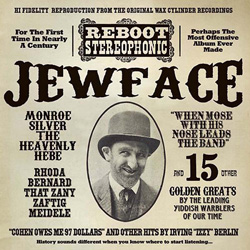
Jewface – Various Artists (CD, $12.99)
 Click here to download liner notes
Click here to download liner notesSample this album: Cohen Owes Me 97 Dollars by Irving Berlin
The trick with this release, Jewface, is mentioning it to loved ones and not getting smacked. In the event of such a reaction, quickly explain that Jewface is the world’s first and only anthology of Jewish minstrel songs, featuring works from Irving Berlin, Gus Kahn, Fanny Brice, Billy Murray, and other vaudeville greats from the turn of the 20 th century. Jewface brings together such rare old-school gems as “Cohen Owes me 97 Dollars,” “Under the Matzos Tree,” and “I’m a Yiddish Cowboy.” You could make these up, but we haven’t. The songs are unbelievably real. They predate irony, and yourself.
Jewface curator Jody Rosen spent over 12 years traveling the country, hunting down the original wax cylinders and seventy-eight disc recordings. His hard work has not only yielded a treasure-trove of re-mastered original recordings from 1903-1924, but also has unmasked a forgotten dirty secret of pop music history; that some of the first hit records ever made were fiendishly catchy musical lampoons, created by Jews, for Jews, and actually loaded with anti-Semitic stereotypes.
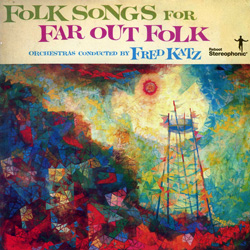
Folk Songs for Far Out Folks – Fred Katz (CD, $12.99)
Sample this album: My Way by The Barry SistersFolk Songs For Far Out Folk is the long-coveted 1959 gem from the eclectic jazz pioneer, Kabbalist, magic man, and eternal left-winger Fred Katz. Katz is best known for introducing cello to jazz, which he perfected in the 1950s with his famous stint with west coast jazz legends, the Chico Hamilton Quintet.
Katz has had an extraordinary career, from his early days as a cello student of Pablo Casals to his work in Hollywood scoring Roger Corman films like Little Shop of Horrors and A Bucket of Blood, from his anti-Vietnam War piece for solo cello “The Soldier Puppet” to his late 50’s stint as an A&R man for Decca Records where he created the experimental Jazz Moods series; from solo jazz cello albums like Fred Katz and His Jammers to his conducting jazz arrangements for Sidney Poitier (the forgotten Sidney Poitier Reads Plato) and Harpo Marx (the almost forgotten Harpo in Hi-Fi) and his 1980s stint teaching jazz in a Benedictine monastery with a bongo-playing nun and a sax-playing priest.
Folk Songs For Far Out Folk is a musical triptych of orchestrated jazz based on Hebraic, African, and American folk songs. “Those were the three cultures that were most important to me at the time,” Katz says. “The American culture I was very interested in but mostly as a radical guy who had to learn about folk music and protest songs. And the African element just followed because of my belief in the oneness of man. The reason for the Jewish stuff was the mystery. It’s impossible to ever know what God is. The trillion-faced God!”
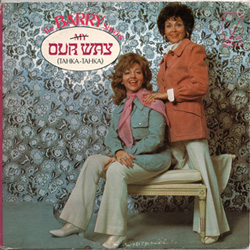
Our Way – The Barry Sisters (CD, $12.99)
Sample this album: My Way by The Barry Sisters“We take a tune that’s sweet and low, and rock it solid and make it gold.” And rock it solid they did, on Our Way, the Barry Sisters’ eleventh, and last, full-length studio recording. Throughout their career, they consistently drew from the wells of Yiddish and English popular song, everything from “Without a Song” and “Cry Me a River” to “Hava Nagila” and “Chiribim Chiribom”. If adapting Jewish music to the rhythms and contours of the American pop landscape can be considered one of the dominant aesthetics of early twentieth century popular music, then the Barry Sisters ought to be considered crucial bi-cultural pioneers, part of the same treasured artistic genealogy that usually starts and stops with the Tin Pan Alley likes of Irving Berlin, George Gershwin, and Harold Arlen. They didn’t turn America Jewish, they made Jewish sound more American.
On Our Way, the Barry Sisters choose the elegant tradition of popular song itself. They took on the 20s pop chestnut “Tea For Two,” used Yiddish to return the vanilla Perry Como smash “It’s Impossible” to its Mexican bolero roots, raided Hollywood for “Love Story” (imagine Ryan O’Neal crooning in Yiddish at the bedside of a dying Ali McGraw), raided Broadway for “Cabaret” and “Alice Blue Gown,” and turned out what just might be– second only to the one Cuban audio priestess La Lupe did just three years earlier– the most liberating version ever of the Sinatra staple, “My Way.”
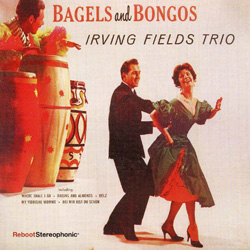
Bagels and Bongos – Irving Fields Trio (CD, SOLD OUT)
Your Miami-bound snowbird grandparents weren’t the first Jews to embrace the mambo pace. Neither was Irving Fields, incidentally, though he’s probably the first person to lay down a fusion of Jewish rhythm and Cuban and Puerto Rican stylistics on wax. Idelsohn Society’s first release is a re-mastered version of the 1959 ground-breaking release, Bagels and Bongos, by the Irving Fields Trio. Using Latin music as an idiom of Jewish expression, a new language of a hybridized, flexible Jewish identity was born—and no one’s heard from the old language of hybridized, flexible Jewish identity since. Bagels and Bongos features classic reinterpretations of numbers like “My Yiddishe Momme” and “Bei Mir Bist Du Shon,” as well as the transformation of “Hava Negillah” into “Havannah Negillah,” bound to shake some tuchuses enough to seriously throw off a game of shuffleboard.
All of the Idelsohn Society’s albums are pressed on a limited run due to funding. Help us repress albums currently sold out and bring more great Jewish archival music to life by donating today. Thank you!

